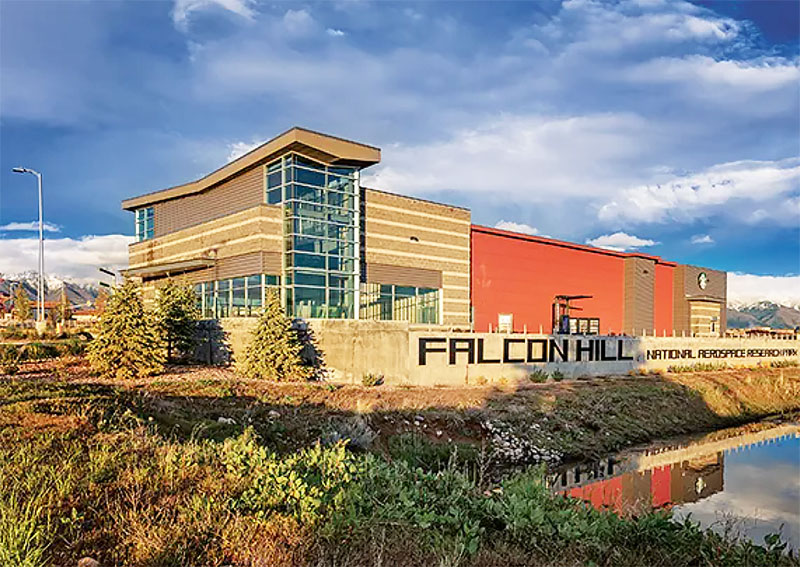Douglas L. DeFries
 If you’re traveling I-15 through Weber and Davis counties, you might want to take note of the growing Falcon Hill Aerospace Research Park near Clearfield and the West Gate of Hill Air Force Base. Its significance to Utah is immense, and even though you get just a quick glance while driving on the interstate, Falcon Hill actually spans an impressive 550 acres. It will eventually feature over 2 million square feet of commercial space for Northern Utah’s booming aerospace and defense sector.
If you’re traveling I-15 through Weber and Davis counties, you might want to take note of the growing Falcon Hill Aerospace Research Park near Clearfield and the West Gate of Hill Air Force Base. Its significance to Utah is immense, and even though you get just a quick glance while driving on the interstate, Falcon Hill actually spans an impressive 550 acres. It will eventually feature over 2 million square feet of commercial space for Northern Utah’s booming aerospace and defense sector.
Why is this important?
Weber and Davis counties have become a mecca for this particular industry, as well as the advanced manufacturing industry. Together, these two sectors bring economic prosperity and thousands of jobs to Northern Utah communities. As a longtime community banker, I have seen the powerful impact this has had on individuals and families and other related businesses. When these types of industries thrive, we all benefit.
The aerospace and defense industry alone accounted for 944 establishments and 31,390 employees in 2020, according to the Utah Governor’s Office of Economic Opportunity (Go Utah).
That number has since grown and will continue to grow as the state draws companies such as Northrop Grumman, which is ever expanding its presence in Northern Utah. The American aerospace and defense manufacturer recently opened a 900,000-square-foot campus within Falcon Hill to serve as headquarters for its team supporting Sentinel, the Ground Based Strategic Deterrent (GBSD) program. With this facility, Northrup Grumman is expected to bring upward of 3,000 additional jobs to Utah. The Roy facility is in addition to Northrop Grumman’s existing sites in Davis County and others that span from Promontory to Bacchus.

Falcon Hill Aerospace Research Park near Clearfield and the West Gate of Hill Air Force Base, is the first U.S. Air Force public/
private partnership. The project is a 550-acre development and is among the most strategically located aerospace research parks in
the nation.
Soon to be joining Falcon Hill is Aerospace Corp., a company that has supported intercontinental ballistic missile (ICBM) programs at Hill Air Force Base for more than 14 years. The company broke ground Oct. 20 on its 24,000-square-foot office, which will accommodate up to 140 employees, more than tripling Aerospace’s current staffing numbers. The company’s local presence is expected to have an approximate economic impact of $13 million by the end of 2023.
Beyond aerospace and defense, manufacturing across all industries is a boon to Northern Utah’s economy.
In 2020, Weber County’s manufacturing sector accounted for nearly 20 percent of the gross domestic product, almost doubling the national and state percentages, according to Go Utah. Per Utah’s Department of Workforce Services, Northern Utah had one of the highest totals for manufacturing jobs, per capita, in the state. The Northern Utah Economic Alliance also touted in its 2022 industry study that one in 10 jobs in Weber County is in manufacturing.
The data that highlights the importance of manufacturing to Northern Utah is impressive, but even more so is the list of incredible products that come out of this sector.
Companies such as Parker Hannifin, Williams International, Autoliv, Fresenius and more produce stellar innovations such as aerospace components, defense software, small gas turbine engines, safety systems, medical equipment, high-end carbon fiber parts and other composite components for different types of aircraft.
Aerospace and defense, combined with advanced manufacturing, will continue to be critical components of Northern Utah’s health and prosperity for many years. What’s also exciting about the growth and success of these industries is that it’s inspiring local educational institutions to expand programs and facilities to meet workforce and innovation needs.
Davis Technical College and Ogden-Weber Technical College, for example, both offer hands-on training and certificates in manufacturing, from composites to industrial automation and robotics to machining to welding.
Weber State University is also investing in facilities and programs to supply graduates in these industries. WSU recently opened the Miller Advanced Research and Solutions (MARS) Center at Falcon Hill, which will give students and faculty opportunities to help advance aerospace and defense. In addition, it will train students for careers in advanced manufacturing.
I am appreciative of our state’s hard work to attract respected companies here. We should all be pleased by accolades such as Forbes ranking Utah as a top-three Best State for Business for over a decade (including six times in the No. 1 spot) and Fox Business giving Utah the No. 1 Best Economic Outlook designation since 2012.
After all, strong industry and business sectors not only drive Northern Utah’s economy in an upward trajectory, they also create opportunities that improve quality of life in our communities.
As I gear up to retire from Bank of Utah in December, I will remain a supporter of Weber and Davis counties and am excited to see what happens next. Based on all of the data and forecasts, I know it will be great.
Douglas L. DeFries is president and CEO for Bank of Utah. He is an alumnus of Utah State University, where he earned his bachelor’s degree and MBA. Actively involved in the community, DeFries has served as chairman of the board for the Ogden/Weber Chamber of Commerce and United Way of Northern Utah, in addition to several statewide community service positions, including the Utah Housing Corporation, Money Management Council and Utah Bankers Association.








